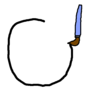 |
Stub Article "Help" - Still-Being-Drawnism This page is a stub. You can help FreePCB by expanding it. |
Dark Deleuzianism is a ideology created by ![]() Andrew Culp and described in his book Dark Deleuze. It attempts to remove any interpretation of Deleuze based off of the acceptance of the current state of things, instead emphasizing the liberatory and destructive potential of anti-capitalist deteritorialization.
Andrew Culp and described in his book Dark Deleuze. It attempts to remove any interpretation of Deleuze based off of the acceptance of the current state of things, instead emphasizing the liberatory and destructive potential of anti-capitalist deteritorialization.
Beliefs
Destructive Deteritorialization
Destructive Deterritorialization refers to the process by which the existing social and political structures are dismantled and transformed. Deterritorialization refers to the breaking down of existing boundaries and structures, while destructive deterritorialization takes this process a step further by emphasizing the destructive and destabilizing aspects of this process. The aim of destructive deterritorialization is to break down existing power structures and social hierarchies, to create space for new forms of social and political organization.
In Dark Deleuzianism, the emphasis on destructive deterritorialization is seen as a necessary response to the oppressive forces of capitalism and authoritarianism. By dismantling the existing structures, Dark Deleuzianism seeks to create new spaces and possibilities for resistance and social change.
Liberatory Potential In Deleuze
Deleuze's work is often associated with concepts such as "rhizome," "nomadism," and "becoming," which challenge traditional hierarchical and binary modes of thought. Dark Deleuzianism argues that these concepts have the potential to inspire new forms of social and political organization that are more inclusive, equitable, and democratic.
One key concept in Deleuze's work that has been taken up by Dark Deleuzianism is the notion of "lines of flight." Deleuze argues that lines of flight are the paths of escape from established structures and the lines along which new structures can be formed. In Dark Deleuzianism, the emphasis on lines of flight is seen as a call to embrace the liberatory potential of Deleuze's philosophy, to challenge and disrupt existing power structures and to create new possibilities for social and political change.
Another key concept in Deleuze's work that has been taken up by Dark Deleuzianism is the notion of "desire." Deleuze argues that desire is a creative and revolutionary force that can be harnessed to challenge the status quo and to create new possibilities for social and political transformation. In Dark Deleuzianism, the emphasis on desire is seen as a call to embrace the chaotic and revolutionary forces that underlie social and political life, to challenge and disrupt existing power structures and to create new possibilities for a more just and equitable society.
Overall, Dark Deleuzianism emphasizes the liberatory potential of Deleuze's philosophy, and seeks to use it as a tool to challenge and transform existing social and political structures. While this approach is controversial and has been criticized for its potential to lead to violence and chaos, proponents of Dark Deleuzianism argue that it is necessary to embrace the chaotic and revolutionary forces that underlie social and political life in order to create a more just and equitable society.
The Spectacle And Biopower
The concept of "the spectacle" is central to Dark Deleuzianism. It refers to the ways in which modern society is organized around the production and consumption of images and symbols, which are used to maintain control and domination over individuals and groups. Dark Deleuzianism argues that the spectacle operates as a form of biopower, or the use of power to control and regulate the bodies and behaviors of individuals.
In Dark Deleuzianism, the emphasis on the spectacle and biopower is seen as a call to challenge and disrupt these systems of control and domination. This involves a rejection of the dominant modes of thought and behavior that are produced and reinforced by the spectacle, and a focus on the development of new forms of resistance and liberation.
One key aspect of this resistance is the development of what Dark Deleuzianism calls "counter-spectacles." These are alternative modes of image and symbol production that challenge and disrupt the dominant modes of thought and behavior produced by the spectacle. By creating new modes of perception and interaction, counter-spectacles offer the potential for liberation and transformation.
To summarize, the emphasis on the spectacle and biopower in Dark Deleuzianism is a call to challenge and disrupt the systems of control and domination that are central to modern society. By rejecting the dominant modes of thought and behavior produced by the spectacle, and developing new forms of resistance and liberation, Dark Deleuzianism seeks to create new possibilities for social and political transformation.
Relations
Friends
Frenemies
Enemies
Further Information
 Books
Books
- Dark Deleuze on The Anarchist Library
| | |
| Main | |
|---|---|
| Variants | |
| Self inserts | |